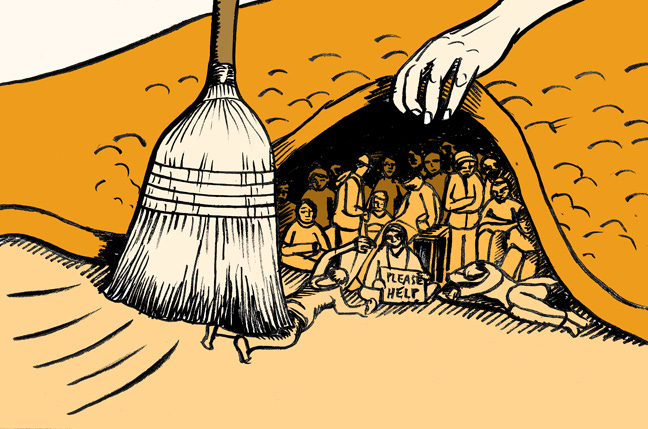Killing Cancer Makes it Metastasize
Why trying to kill cancer without addressing the root cause can kill you.
Ivermectin and Fenbendazole are currently the darlings of the alternative health cancer sphere.
My most popular blog post is a simplified explainer of the mechanisms behind Adam Gaertner’s protocol that utilizes them along with Vitamin C (and baking soda of all things) to wipe out cancer. This protocol has been shown to work in some people, at least in so far as their stage 3 or 4 cancer went away in the immediate term, but, like any generic protocol, it doesn’t always work. And we have no idea what will happen in the long run for people who use this easy out that does not address the underlying causes of cancer, but simply hacks the system to get the immune cells to stop ignoring the cancer and kill it.
The underlying assumption of mainstream cancer care and alternative cancer care is that the body is making a mistake by not killing the cancer, it has been outsmarted by those wily cancer cells. It is the same assumption made about every disease. It is a bad assumption.
But how can literally killing the cancer actually force it to metastasize?
Allow me a superhero metaphor to illustrate: before Disney went super woke they released Avengers: Endgame, which most fans enjoyed. At the beginning of part one the superhero Thor (the immune system) gets trounced by the arch villain Thanos (the cancer).
He then spends the rest of the movie recovering and trying to build a super weapon that can kill Thanos.
He succeeds, and at the end he comes flying out of the sky with his giant battle-ax forged in the heat of a dying star held high which he drives straight into Thanos’ chest.
But it’s not a killer blow, so he starts to push it in past the Big Bad’s ribs towards his heart.
Thanos looks at him and says, "You should have gone for the head,” and promptly snaps his finger to teleport away while simultaneously activating his super weapon that kills half the people in the universe
The point of that rehash of a movie many of you probably didn’t watch is to illustrate that if you don’t hit cancer at the root it can teleport, or metastasize away which in and of itself can end up killing you.
One way this can happen is if you use mainstream medical therapies that prevent mitosis, i.e. cell division. Another way it might happen is if you use alternative therapies like ivermectin and fenbendazole that also inhibit mitotic division of cancer cells.
The question is why?
Now this is where it gets interesting, a bit complicated and theoretical, but also fascinating and we need to take a very slight detour to set the groundwork for understanding it:
Every process in living cells including mitotic cell division depends on a seesaw balance between stimulating and opposing factors.
One of the strongest stimulators for cell division is the UV light released by the nucleus during cell division itself, called biophotons. These biophotons further stimulate nearby cells to divide. The more mitosis there is the more mitosis you get unless it’s otherwise inhibited due to normal feedback loops.
The nature of cancer is to rapidly divide at all costs (as though it is afraid it will die otherwise), sacrificing everything on the altar of rapid cell division, eventually even itself since when it kills you it kills itself too. All the feedback loops that would normally inhibits cancer cell division are severed.
When the cell division seesaw in cancer is successfully tipped towards no division by a chemotherapeutic agent or off-label drug, the cancer desperately casts about for a workaround, some way to weigh down the division stimulating side of the seesaw even more. The easiest available “weight” it can add to its preferred side of the seesaw is to find an external source of UV light - e.g. seek out UV from the sun near the surface of the body, or in another tissue that is not affected by the blocker and is still metabolically active and dividing, producing enough of the precious UV biophotons that the cancer can use to override the mitotic inhibitor and jump start its own cell division again.
So the cancer metastasizes.
Often the drugs used to stop cancer from dividing, and thus kill it, will work on most of the cancer cells, but not all of them, since they mutate very rapidly and develop resistance to single therapeutics. Then you’ve got metastasized and resistant cancer.
Rinse and repeat, at each stage not completely killing the thing, and driving it to teleport elsewhere, and eventually you’ve checkmated yourself by making the same wrong move repeatedly.
This is one example of a broader problem: incomplete, inadequate approaches to chronic diseases like cancer.
Chronic diseases are mostly initiated by chronic toxicity: environmental, mental, emotional, physical, energetic, etc.
If detox organs and pathways are operating sub-optimally due to chronic toxicity, then the body responds as best it can by trying to contain it, wall it off, live with it.
We interfere and instead of dealing with the underlying cause, we sweep it under the rug and deal only with the intermediate effects: the chronic inflammation or cancer that results. We may even poke holes in it and let out what’s bottled up.
And if we do succeed in eliminating the inflammation or cancer, the underlying toxicity is released to wreak havoc on us, and sooner or later the same thing or something worse pops up again.
This is why there is no easy way out of a serious illness. The illness itself is your body's best solution to your underlying problem, so you can’t just "treat" the illness, you have to treat the underlying problem that caused it.
This is inherently hard, because we don’t like to change.
We don’t like to take bitter medicine, but real medicine is always bitter, because although we like our imbalances and think they make us who we are, real medicine fixes the chronic imbalance that made you sick in the first place. It requires you to stop hurting yourself, and to remove the effects of all the harm you've done. And in the modern world that is so fundamentally toxic because of its very unnatural nature, that can mean changing everything about your life.
The good news is that what initially tastes bitter soon tastes sweet. It was actually sweet all along, you just couldn’t tell like an animal with rabies dying of thirst yet violently unable to stomach any water.
So if you really want to get better you will have to make the hard choices and permanent changes you already know you should have done long ago, and you will also likely have to discover some mistakes you didn’t even know you were making, like injection yourself with poisons, eating and drinking poisons, sleeping bathed in toxic unnatural energies like WiFi, not getting enough sun (yes, cancer needs UV, but you need it even more, especially if you have cancer), not sleeping enough since you leave the lights on late at night, not getting enough electrons into your body because you’re never grounded, etc.
Many people will still be inclined to gamble with their lives (yes, some people get rid of cancer with ivermectin and fenbendazole, but not everyone, and yes, it’s better than using chemo and radiation, but what eventually comes next could be very problematic) rather than taking a higher, harder road, but at least I will have delivered the warning and those who take heed will benefit from it, which is what matters.
And if things progress too far, due to repeated mistakes in “treatment” then perhaps some will turn back and seek out really expert guidance to unravel the Gordian knot they’ve created for themselves before it’s too late. Because unlike the story of Alexander there is no way to just chop it in half without chopping yourself to pieces too.
There is no simple, quick fix, but there is always a solution for those determined enough to take it.










Good article. Many people using ivermectin to fight cancer are buying time to use other methods to detox and deal with the underlaying imbalances and problems. Terrain is huge in fighting any medical problem. Thanks for inspiring them to go beyond the quick fix and pursue better overall health.
So what is the solution?